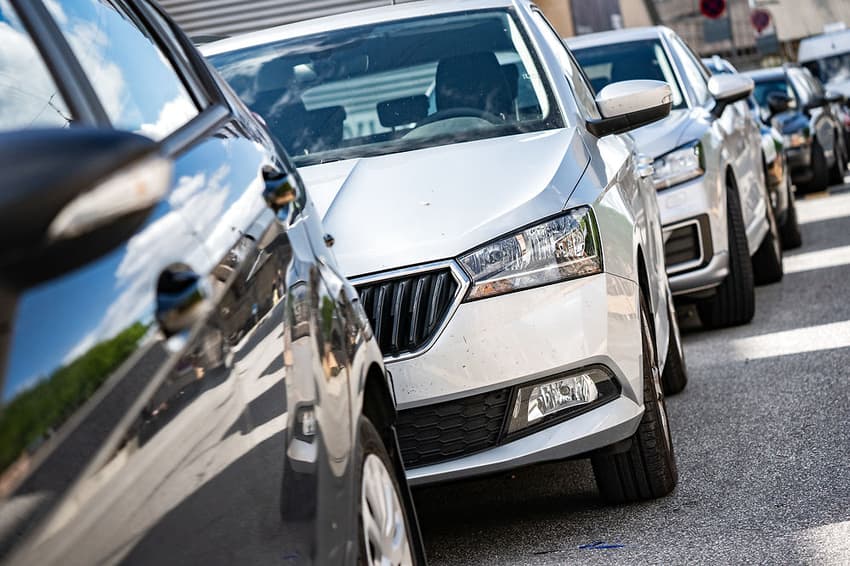How will Denmark’s new transport proposal affect the cost of cars?

A new system for applying registration fees to electric and fossil fuel-powered cars is part of a climate and transport proposal launched by the Danish government this week.
On Thursday, the government began negotiations over a planned reform to transport taxes which it has said will correct the ‘uneven’ current system.
The proposal includes measures aimed at increasing incentives to buy and use electric cars, in line with the government’s stated target of increasing the number of such cars from 45,000 to 500,000 on Danish roads by 2030.
To that end, the proposal seeks to make popular models of electric cars equivalent in price to their fossil fuel-driven counterparts and to end large subsidies on luxury electric vehicles.
Under current rules, newly-purchased electric cars are only liable for 20 percent of overall registration fees and are also encompassed by exemptions for 40,000 kroner of their value.
This means that, in practice, electric cars worth up to 400,000 kroner are free of registration fees.
READ ALSO: Explained: Why is it so expensive to buy a car in Denmark?
But the current rules also mean that larger electric cars achieve the biggest registrations fee subsidies. That would change under the new proposal.
The new system for applying registration fees to electric cars is part of a broader climate transport proposal. It also includes provisions to change the way registration fees are applied to traditional petrol and diesel cars.
Taxes on these types of car were reduced in 2017 under the previous government, but they are now set to become more expensive to run again through increased fuel costs as well as changes to the existing car tax system.
“The registration tax on purchase price for the cars we most commonly own will make the new-purchase price increase by around one percent. For more expensive cars, the new-purchase price will increase by around 1-4 percent,” tax minister Morten Bødskov told DR.
Changes in fuel prices will make it more only slightly more costly for petrol and diesel car owners to refuel, compared to electric car drivers.
“For normal family cars with normal daily fuel use for petrol cost the owner in the region of 60 kroner (extra) per year,” Bødskov said.
“For diesel cars it is a bit more expensive, but there we are talking about 300 kroner per year,” he added.
The minority government will now negotiate with parliamentary partners in order to achieve a majority for the overall proposal.
READ ALSO:
Comments
See Also
On Thursday, the government began negotiations over a planned reform to transport taxes which it has said will correct the ‘uneven’ current system.
The proposal includes measures aimed at increasing incentives to buy and use electric cars, in line with the government’s stated target of increasing the number of such cars from 45,000 to 500,000 on Danish roads by 2030.
To that end, the proposal seeks to make popular models of electric cars equivalent in price to their fossil fuel-driven counterparts and to end large subsidies on luxury electric vehicles.
Under current rules, newly-purchased electric cars are only liable for 20 percent of overall registration fees and are also encompassed by exemptions for 40,000 kroner of their value.
This means that, in practice, electric cars worth up to 400,000 kroner are free of registration fees.
READ ALSO: Explained: Why is it so expensive to buy a car in Denmark?
But the current rules also mean that larger electric cars achieve the biggest registrations fee subsidies. That would change under the new proposal.
The new system for applying registration fees to electric cars is part of a broader climate transport proposal. It also includes provisions to change the way registration fees are applied to traditional petrol and diesel cars.
Taxes on these types of car were reduced in 2017 under the previous government, but they are now set to become more expensive to run again through increased fuel costs as well as changes to the existing car tax system.
“The registration tax on purchase price for the cars we most commonly own will make the new-purchase price increase by around one percent. For more expensive cars, the new-purchase price will increase by around 1-4 percent,” tax minister Morten Bødskov told DR.
Changes in fuel prices will make it more only slightly more costly for petrol and diesel car owners to refuel, compared to electric car drivers.
“For normal family cars with normal daily fuel use for petrol cost the owner in the region of 60 kroner (extra) per year,” Bødskov said.
“For diesel cars it is a bit more expensive, but there we are talking about 300 kroner per year,” he added.
The minority government will now negotiate with parliamentary partners in order to achieve a majority for the overall proposal.
READ ALSO:
Join the conversation in our comments section below. Share your own views and experience and if you have a question or suggestion for our journalists then email us at [email protected].
Please keep comments civil, constructive and on topic – and make sure to read our terms of use before getting involved.
Please log in here to leave a comment.